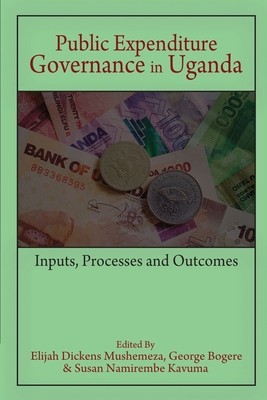
- We will send in 10–14 business days.
- Publisher: Adonis & Abbey Publishers
- ISBN-10: 190911281X
- ISBN-13: 9781909112810
- Format: 15.6 x 23.4 x 1.4 cm, minkšti viršeliai
- Language: English
- SAVE -10% with code: EXTRA
Public Expenditure Governance in Uganda (e-book) (used book) | bookbook.eu
Reviews
Description
Good governance of public resources has a far reaching impact on development outcomes. Over time it has become clear that capitalism has excluded a larger part of society, leading to worsening development indicators. Cognisant of the limited participation of rural communities in development, Uganda introduced a decentralisation policy in 1992 in a bid to involve more communities in the development process. The policy transferred powers, responsibilities and resources to local governments. By devolving powers to district leaders, it was envisioned that the decentralisation policy would improve service delivery and political accountability.
This book analyses the nexus between public expenditure, governance and development outcomes in Uganda.
It presents several case studies in four sectors; agriculture, health, education and roads to demonstrate the interaction of various actors in the management of public expenditure within a political economy conceptual framework. Based on these, the book contends that a mere allocation of public resources without the appropriate functioning of institutions may limit the achievement of the desired development outcomes.
_____________________________________________________________________________
Elijah Dickens Mushemeza is a Professor of Political Science and Development Studies at Ankole Western University and a Senior Consultant at Advocates Coalition for Development and Environment.
George Bogere manages the Centre for Budget and Economic Governance at ACODE, before joining ACODE he worked as a Researcher at Makerere Institute of Social Research (MISR).
Susan Kavuma is a Lecturer in the School of Economics at Makerere University and a Research Fellow at ACODE.
EXTRA 10 % discount with code: EXTRA
The promotion ends in 21d.02:51:51
The discount code is valid when purchasing from 10 €. Discounts do not stack.
- Publisher: Adonis & Abbey Publishers
- ISBN-10: 190911281X
- ISBN-13: 9781909112810
- Format: 15.6 x 23.4 x 1.4 cm, minkšti viršeliai
- Language: English English
Good governance of public resources has a far reaching impact on development outcomes. Over time it has become clear that capitalism has excluded a larger part of society, leading to worsening development indicators. Cognisant of the limited participation of rural communities in development, Uganda introduced a decentralisation policy in 1992 in a bid to involve more communities in the development process. The policy transferred powers, responsibilities and resources to local governments. By devolving powers to district leaders, it was envisioned that the decentralisation policy would improve service delivery and political accountability.
This book analyses the nexus between public expenditure, governance and development outcomes in Uganda.
It presents several case studies in four sectors; agriculture, health, education and roads to demonstrate the interaction of various actors in the management of public expenditure within a political economy conceptual framework. Based on these, the book contends that a mere allocation of public resources without the appropriate functioning of institutions may limit the achievement of the desired development outcomes.
_____________________________________________________________________________
Elijah Dickens Mushemeza is a Professor of Political Science and Development Studies at Ankole Western University and a Senior Consultant at Advocates Coalition for Development and Environment.
George Bogere manages the Centre for Budget and Economic Governance at ACODE, before joining ACODE he worked as a Researcher at Makerere Institute of Social Research (MISR).
Susan Kavuma is a Lecturer in the School of Economics at Makerere University and a Research Fellow at ACODE.


Reviews